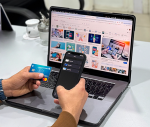You are here
Computers are about numbers
By Jean-Claude Elias - Dec 06,2018 - Last updated at Dec 06,2018
The readers of this column will forgive me if they find the title of this week’s article somewhat obvious. Of course, we all know that computers are about numbers, but we often forget it. Does it really matter? Is there any point in keeping in mind this trait of the devices?
It is understood that we do not have to be mathematicians to use computers; thank God for that. However, like driving a car and just knowing that there is an engine under the bonnet without being yourself a mechanic, it is good from time to time to remember that everything we see, hear, read or write while using a computer is a matter of zeroes and ones in the end, deep inside the guts of the machine.
What happens between the “zeroes and ones” stage and the one that shows us photos, plays music, takes us to the Internet, or processes text is another story. It is actually what makes computers truly magical digital devices, though we tend to forget it.
Remembering that it is all about numbers has advantages. To start with it allows you to better communicate with parties who do need to talk numbers. These can be your Internet service provider, the salesperson trying to recommend this or that model of laptop, or the IT technician who is trying to repair your computer. You really need to talk gigabytes and such numbers with them. For instance many consumers still make the confusion between megabyte and megabit when referring to an Internet connection speed. The first unit being eight times higher than the second.
People working at helpdesks often find it hard to communicate with users and solve their problems, precisely because of a general lack in technical knowledge at the users’ end.
All computer operating systems have a function that lets you check and monitor how much memory and processing power is actually taken by the various software applications you use. This is a precious “gauge” (to use automotive terminology) that allows each and every one of us to optimise our computers’ performance by seeing which of the programmes we are running consumes the most memory, processing power or disk space.
It is simple and does not take real mathematics to run, but it does requires reading and understanding numbers. Under MS-Windows operating system this gauge is found under Task Manager and can be directly called by pressing the Alt+Ctrl+Delete keys combination.
Another illustration of the importance of numbers is your device’s IP address. This is the number that the network you are connected to gives you and that uniquely identifies your computer, in the whole world! It is like your phone number when you include the country and area code. It is unique in the world. Until recently IP addresses have been using what is called the IPV4 protocol (or numbering method) that can handle up to 4.3 billion addresses, given its numbering structure.
Now 4.3 billion computer Internet addresses are just not enough anymore, given the extraordinary usage of the web by not only computers but also by a growing number of devices, including smartphones, connected TVs and countless other Internet-enabled equipment. The industry is now replacing IPV4 with IPV6, an updated numbering system for Internet-connected devices that can handle a numbers of addresses equivalent to “2 power 128”. This is the number 340 followed by 36 zeroes! IPV6 should serve the world for a while. It is numbers again.
And if you think you’ll never need to know your computer’s IP address think again. You’ll be asked for it in many instances. If you don’t know it — and you certainly do not need to memorise it — just open a web tab in your Internet browser and type “What is my IP”, you will immediately see the answer in the form of a number consisting of four sets of up to three digits each, separated by a dot, that is if you are still under the IPV4 Internet protocol, 149.200.113.11 for instance.
Understanding numbers is also very helpful when processing images and making decisions about the resolution or the pixel count, or compressing the image before emailing it. Let is not forget the fringe benefit that also comes from being able to talk numbers: it is a social one and it lets you better discuss computers and IT matters with your friends in the evening.
Whatever you do with your computers, ignoring numbers may be a limiting factor.
Related Articles
So it’s agreed, we’re all connected now and there’s no going back or disconnecting. The term, however, has taken a new dimension with the complexity of the connection, or the interconnection should I say.
“I’m on the network.” “There’s no network today.” “We’re setting up a new internal network in our office.” “I enjoy social networking.” Thes
So you’ve just been told to work at home, and now you’re wondering how to get it done.Thanks to advancements in technology, it’s never been
















